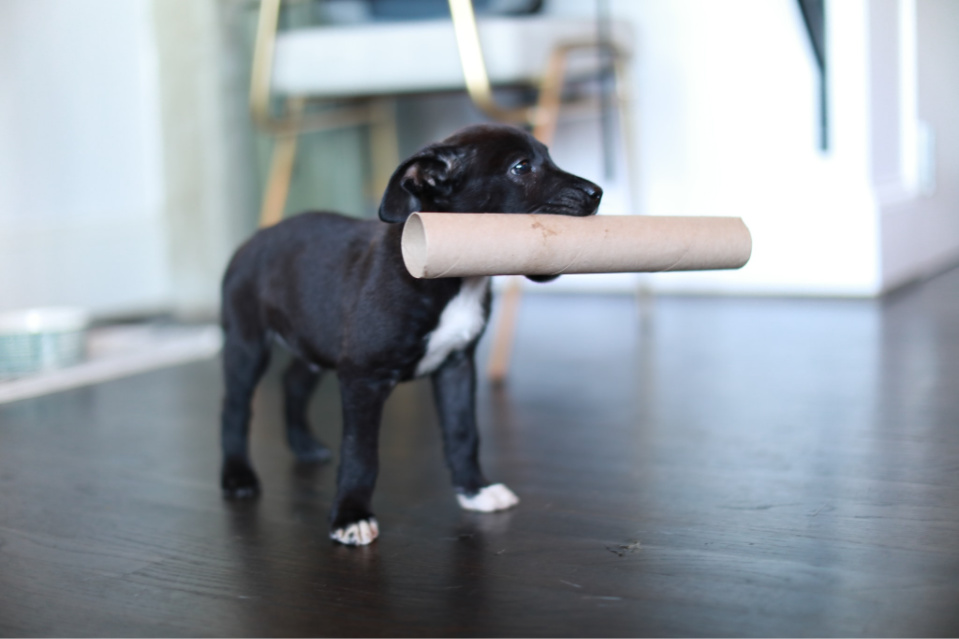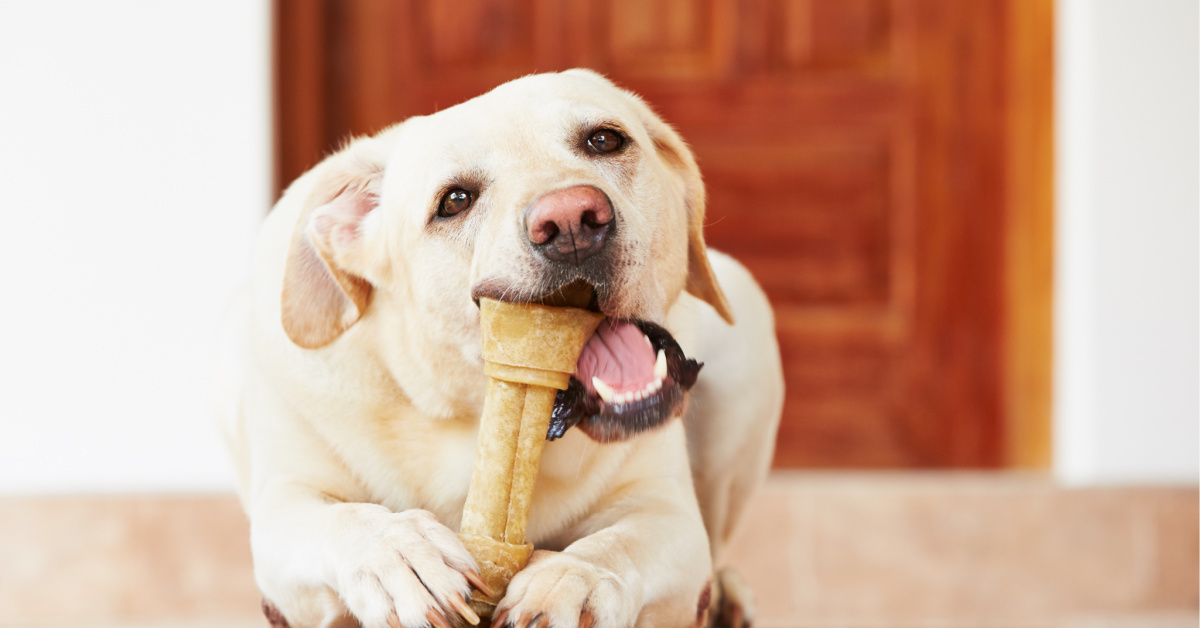If you have a new Labrador puppy, you may love it to bits for the reasons found here. However, there may be one big problem you have with them is you have to care about labrador puppy teething.
Luckily, you don’t have to worry about your Labrador pup growing their teeth. Here is a beginner’s guide to labrador teething and how you can deal with it.
Why Is My Labrador Puppy Teething?
As we have explained in our previous post, Labrador pups have a habit of biting everything in their early months. While this may seem like an indicator of aggressive behavior, it’s actually not.
Like humans, puppies are born without teeth. However, puppies grow 28 teeth pretty quickly! The 28 teeth are called their “baby” teeth, which means that they will fall out and be replaced with adult teeth.
When your puppy loses teeth and grows adult ones, it can be painful. Their gums will feel sore, and they will try to soothe their pain by teething.
Labrador Puppy Teething Timeline—How Long Does Lab Teething Last?
Teething can last for around 6-8 months, but it depends on your dog. Your Labrador puppy’s teething may start when they are 2 weeks old because that is when their baby teeth start to grow.
Your Labrador puppy usually starts losing their baby teeth when they are 4 months old. All of your puppy’s baby teeth should fall out when they turn 6 months old. If not, you need to go to a veterinarian to remove them.
So, your puppy will start teething when they are 2 weeks old, and it will continue until they are 6-8 months old.
What Are Puppy Teething Symptoms?
Look at the things that your puppy bites, like their toys. You might see tiny blood spots on it. Your puppy may also drool a bit more than usual.
Your puppy may also start chewing random items and their toys more often to try relieving their sore gums. Make sure you throw out toys that are breaking apart because they might swallow small bits of it.
Apart from blood on their toys and increased drooling, you may also notice that your Labrador puppy is eating at a slower pace than their usual. Or, they may even be hesitating to eat. Increased whining, red and/or swollen gums, and a low fever are also other symptoms that your Labrador puppy is teething.
If you think anything is unusual, it would be best to bring your pup to a veterinarian.
Does Teething Hurt?
Puppy teething itself does not always hurt. Your puppy is teething because they want to soothe their sore gums, as old teeth fall out and new ones grow.
However, you should bring your Lab puppy to a veterinarian if you notice that there are lots of blood spots, your puppy frequently cries in pain, or if they are not eating. There may be other underlying reasons for that, and you will need to get your Labrador pup checked immediately.
Common Puppy Dental Problems

You may want to keep an eye on your puppy’s teeth as they grow to make sure that everything is okay.
Some common puppy dental problems that will require you to bring your puppy to a vet include:
- Malocclusions (overbite, underbite, crossbite, etc.)
- Missing tooth (example: baby tooth fell out, and adult tooth never grew)
- Impacted teeth
- Adult teeth growing very crookedly
- Pain, swelling, and redness in gums (especially if severe and did not result from teething)
- Damaged or broken teeth
Essential Tips to Deal with Labrador Puppy Teething
Tip 1: Get them puppy teething toys.
A great way to help your puppy while their new teeth grow is to get them puppy teething toys. These toys are flexible and soft, which means they are perfect to help your puppy soothe their painful gums.
While your puppy might break these toys quickly, you do not want to give them hard toys. If the toy is too hard to break, flex, or bend, then it will not help your puppy feel better.
Tip 2: Give them frozen mini bagels.
You can give your pup a frozen mini bagel 1-2 times a week. This will help relieve them from their gum pain while having a tasty treat.
Let them chew on it as they eventually eat it. The bagel will help make their gums feel numb, which gives them temporary relief from their pain. Plus, the bagel’s denseness can help remove any loose baby teeth.
Tip 3: Give them cold carrots.
If you are looking for a different snack that you can give to your Labrador puppy for their teething, you can give them cold carrots. Cold carrots are full of vitamins and minerals. It can also help ease their pain.
However, you should not give more than ½ – 1 carrot a day. Carrots are high in fiber, so too much of it can also make your dog’s tummy upset.
Tip 4: Get them frozen fruits.
You can give your Lab puppy some frozen fruit, which is a tasty way for them to teeth. Some frozen fruit you can give them include banana slices and strawberries. Make sure to check if the fruit is safe for dogs to eat before feeding them.
The frozen fruit can help make their gums feel numb as they enjoy the taste. Keep in mind, though, that frozen fruit can get mushy, so there might be a little messy leftover.
Tip 5: Use a clean towel or dish rag.
Use water to make a clean dish rag or towel wet. Twist it until you make a rope shape. Keep it in the freezer until it is frozen.
Once it is frozen, you can slightly thaw it out for a few minutes then let your Labrador puppy enjoy playing with it. The cold will help relieve any discomfort your puppy may feel. Plus, it will help your Labrador pup learn what they can and cannot chew on while they teeth.
Tip 6: Never give ice cubes.
Since you can give your dog frozen treats like fruit and mini bagels, does that mean you can give them ice cubes?
Actually, the answer is no. You should never give your Labrador puppy ice cubes.
Ice cubes encourage your dog to bite through it until it breaks. Puppy teeth are very fragile, so ice cubes can break their teeth.
Tip 7: Never give over-the-counter pain medication.
While your dog may feel uncomfortable, you should not give them over-the-counter pain medication, especially without your vet’s permission. Otherwise, it could put their health at risk.
You should also be wary of holistic remedies. Some people may suggest that you can give your dog clove oil, but veterinarians do not recommend that as a pain reliever for your Labrador pup’s gum pain.
In conclusion…
Teething is a natural part of your puppy’s life, and completing this teething phase safely is important to keep your Labrador retriever healthy in the long run.
To help them survive this painful stage, you can give your Lab pup frozen treats, get them puppy teething toys, and avoid holistic remedies and over-the-counter pain medication without the permission of your vet.
If you need other tips on how to care for your new Labrador puppies, you may check them out here.







